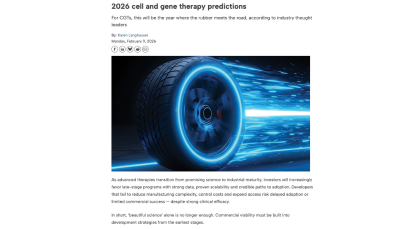Services
Chemistry, Manufacturing, and Controls (CMC) Regulatory Consulting
Phase-Appropriate CMC Support from pre-IND Through Commercialization
Strategic product development and CMC regulatory planning start early on at the pre-IND stage and apply to the entire development lifecycle through to post-approval. Planning manufacturing and analytical programs and generating the required documentation are crucial to successfully supporting regulatory filings in a cost and time-effective manner and ensuring that FDA regulators support your development plan.
Whether you are preparing for an IND, getting ready to file a marketing application, or need to make post-marketing changes, Veristat regulatory experts are experienced in helping sponsors establish CMC strategies designed to meet FDA requirements.
Significantly Reduce Regulatory Risk with Targeted Expertise
Without comprehensive strategic planning and proper documentation, INDs can be placed on clinical hold for failing to properly demonstrate phase-appropriate CMC safety and quality requirements. Many NDA/BLA approvals also get delayed due to failure to address agency expectations or requests regarding manufacturing issues.
To help you overcome CMC challenges, Veristat is poised to support your manufacturing,
-
Support for established programs where additional CMC team members are needed.
-
Comprehensive CMC strategic development plans and submission filing plans.
-
Development of your analytical and characterization studies and stability programs needed to support clinical use.
-
Planning of batch size and disposition to meet all analytical, non-clinical, and clinical needs, including projection of appropriate overages to cover manufacturing losses and unforeseen analytical and clinical use.
-
Guidance on the required source documentation needed for IND and marketing application.
-
CMC submission and program Gap Analysis
-
CMC Technical Writing from meeting packages to market applications
-
Generation of Structure Data (SD) Files that are now required for NDAs, DMFs, and ANDAs, for the FDA’s KASA review program, and strongly encouraged for other CMC submissions.
-
Prepare, lead, and facilitate CMC interactions with FDA.
The FDA guidance regarding Content and Format for INDs for Phase 1 points out, 'The identification of a safety concern or insufficient data to make an evaluation of safety is the only basis for a clinical hold based on the CMC section.
U.S. FDA
-
Let's Talk.
Contact Veristat Today!We know there are always unknown challenges when bringing a novel therapeutics to market, so we’ve assembled an extraordinary team of scientific minded experts who have mastered the complexities of therapeutic development enabling sponsors to succeed in extending and saving lives.
CMC Points to Consider for Sponsors of First Initial IND
As a first-time IND applicant utilizing contract manufacturing, do you have the capacity and experience needed to:
-
Develop an effective and efficient CMC program that will meet all current regulatory requirements to support an FIH clinical trial.
-
Establish an effective regulatory strategy that utilizes appropriate pathways and or accelerated programs.
-
Select and oversee contract manufacturers.
-
Work with the manufacturer to establish and optimize the process.
-
Work with the manufacturer to establish an analytical program appropriate to support a successful IND application.
-
Work with the manufacturer to generate appropriate manufacturing documentation for the process and analytical programs including batch records, specifications, methods, and reports required to support an IND application.
-
Author and/or review CMC content for PIND meetings and mediate interactions with the FDA.
-
Author and/or review quality sections of an IND application.
Podcast: CMC Pitfalls – From Benchtop to IND
Veristat CMC experts outline key fundamentals and pitfalls new sponsors must consider when determining readiness to file an IND from a manufacturing perspective. Listen to the full episode to learn more about how to successfully transition from academic or bench-top production to manufacturing clinical-grade material to support an IND with the FDA.
Implement the Right CMC Regulatory Strategy for Your Drug/Biologic
Sponsors need to place an equivalent emphasis early on with their CMC or manufacturing development plans as they do their clinical development plans. Although the manufacturing plan is not a required component of an IND submission, carefully mapping out the projected analytical and clinical needs for each stage of development will help you anticipate CMC needs and reduces time delays and unexpected costs.
Veristat’s scientific-minded team of Regulatory Affairs CMC experts support these focus areas:
Starting at the pre-IND stage, we support you in implementing long-range comprehensive planning for manufacturing and analytical programs to avoid CMC pitfalls that can result in unnecessary costs and extensive program delays.
Veristat guides sponsors through the planning process taking into consideration the product, the regulatory pathway, CMC requirements, key milestones, potential hurdles and risks, the current regulatory landscape, and business considerations.
Our Regulatory CMC experts support the authoring and/or review of the Module 3 section of an IND or marketing application by integrating the required content with an appropriate amount of detail in a clear, concise, and easy-to-review format for health authorities.
Sponsors new to development often fail to realize that CMOs (Contract Manufacturing Organizations) usually do not author regulatory submissions, or if they do, it is not done with the experience of a regulatory CMC expert and the resulting submission could result in information requests, and/or clinical holds.
Interactions with the FDA regarding CMC are critical, starting with Pre-IND meetings. During the Pre-IND meeting, discussions must take place about any manufacturing techniques where regulations/guidelines don’t exist yet or require flexibility (e.g., complex biologics, cell therapies, etc.)
Veristat supports the entire process of preparing for, attending, and performing follow-ups for all meetings with FDA that address CMC.
Manufacturing processes evolve throughout the lifecycle of a development program. Careful planning for the changes to reduce quality and regulatory risk is paramount. Demonstrating that the current product is comparable to the original is necessary with any manufacturing change.
FDA buy-in on comparability plans is crucial to avoid or reduce the scope of bridging studies. Our regulatory experts support the entire process from preparing for and implementing manufacturing changes to gaining FDA agreement of comparability.
CMC Considerations for Planning Comparability Studies for Biotherapeutics Development
Comparability studies pose a significant issue for those working in biotherapeutics development, as undetected product changes are considered high risk. Learn the importance of comparability studies for biologics, key aspects of assessing comparability, and how to successfully plan your clinical and CMC manufacturing development plans.











